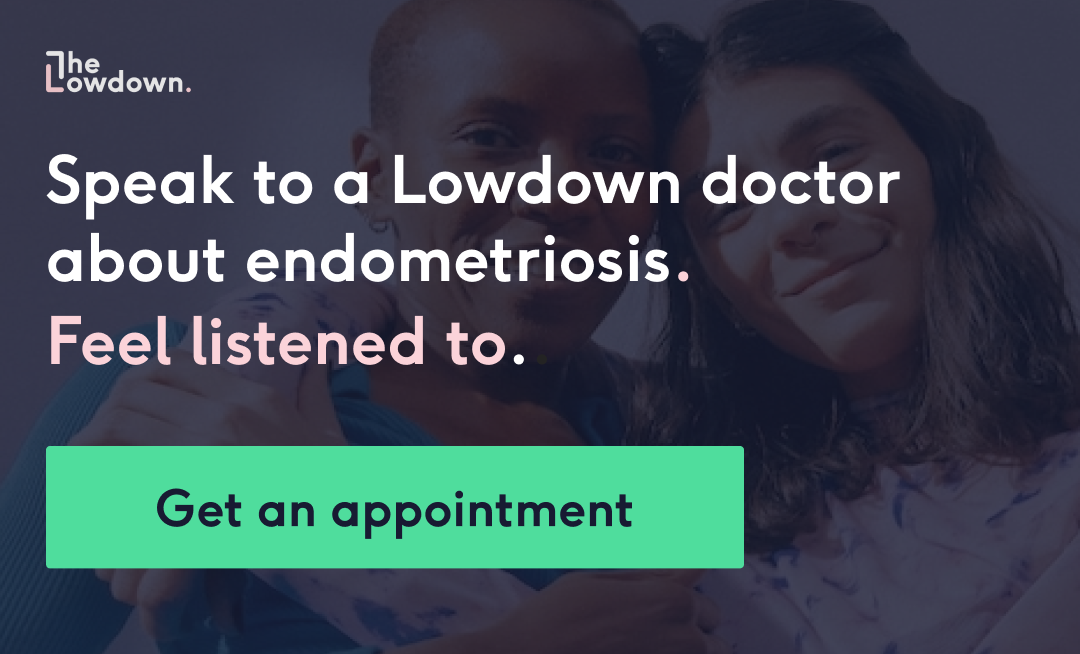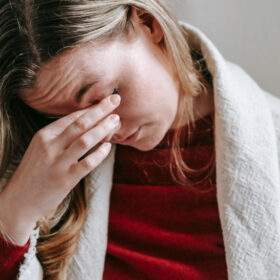
What does endometriosis feel like? How to discuss with your doctor
We asked our Instagram community how they describe their endometriosis pain. NHS registered GP, Dr Fran Yarlett explains how people with endometriosis can talk to their GP about this kind of pain. This post contains real quotes from people living with endometriosis.
What is endometriosis pain?
Endometriosis is a common health condition that can cause heavy, painful periods, painful sex and affect your quality of life. It takes an average of 7-8 years to diagnose endometriosis. So how can you speak to your GP about your symptoms to speed this up?
Endometriosis pain is often described as moderate to severe – but that can mean different things to different people. The pain may start in your lower stomach or pelvic area but can spread around your lower back and into your legs. Paracetamol or ibuprofen might take the edge off but often does not completely get rid of the pain.
Pain can start a couple of days before your period and might last all the way through your period and for several days after. Some people may even experience constant pelvic pain.
Endometriosis can also cause bleeding symptoms including heavy periods, long periods, bleeding between periods or passing old or dark blood before a period.
What does endometriosis feel like?
Endometriosis pain may be felt as burning, stabbing, pressure-like, cramping, throbbing or any other description of pain found in a thesaurus. Pain is subjective meaning people feel it in individual ways. We asked our community what endometriosis feels like:
“Knife stabbing arse. Uterus trying to fall out. Radiating pain into legs.”
“Constant ache, pulling, sharp stab pains, twisting, unbearable, exhausting”
“Stabbing, burning, searing, crippling, nausea inducing, so bad you pass out from it”
“At its worse it felt like everything inside was burning and ripping”
“Like barbwire inside my pelvis”
“Like Freddie Kruger is clawing at my insides”
The most common answer to describe endo pain from our community was “debilitating”. You can read through our shared endometriosis experiences and ask our community how they describe their pain.
As GPs, we’re looking for any pain which affects your ability to carry out your daily activities.
“Paralysing. Nothing else matters when it happens”
“All consuming. Cannot focus on anything else”
For example: if you’re unable to work, go to school, exercise, put out the washing, walk the dog etc. This is a key symptom, and even if this doesn’t turn out to be endometriosis, if period pain is affecting your quality of life, you should always seek help, because we can make things much better!
How to explain endometriosis pain?
It can be daunting to visit your GP, especially when appointments are so short.
“It’s not just the debilitating pain, it’s the added weight of people not believing you”
During consultations for possible endometriosis, I want to know:
- Where the pain is and where it spreads to.
- When the pain comes on and how long it lasts.
- What the pain feels like.
- How bad the pain is. Often a scale of pain from 1 to 10 is useful, with 1 being no pain, and 10 being the worst pain you’ve ever experienced.
“6 on a good day. 15 on a bad!”
“10 + on bad days…. 4-6 everyday life”
- What makes the pain better or worse (including sex!)
- Any other symptoms, and I mean ANY, because some symptoms may be relevant even if you do not think they are.
Other symptoms usually associated with endometriosis include fatigue, low mood, bloating, pain during sex, pain opening your bowels (especially during your period) and blood in your urine or stool during your period.
It’s really helpful if you bring answers to these questions to your appointment, alongside a log of symptoms throughout 3 cycles to identify any patterns associated with your period.
How to treat endometriosis pain?
The pain from endometriosis can be debilitating but there are treatments.
- Painkillers including paracetamol and ibuprofen are available over the counter or prescription only medications such as mefenamic acid
- Hormonal contraceptives are effective at treating pain and you can use our recommender to find the right fit for you
- Taking supplements, such as Wild Nutrition, can help target hormonal support. They will help overcome fatigue and tiredness too.
- TENS machines such as the Myoovi are clinically proven to help (purchase one via our affiliate link – they’re currently on offer!)
- The good old hot water bottle!
- Alternative therapies such as acupuncture may be beneficial for some women but the research around this isn’t great
- A women’s health physio can help with exercises to improve pain
How to get diagnosed with endometriosis?
After your GP appointment, you might be offered treatments, investigations and/or a referral to a gynaecologist. Endometriosis can be diagnosed through scans of the pelvis including ultrasound or MRI.
However, these are not always the most accurate, and a normal scan does not rule out a diagnosis of endometriosis. If scans are normal but you have ongoing symptoms, a keyhole surgical procedure called a laparoscopy is the usual investigation to diagnose endometriosis.
You need to be seen by a gynaecologist before being placed on a waiting list for a laparoscopy. Waiting lists for gynaecology appointments and laparoscopies can be long, which is annoying, and why treatment for your symptoms should be started while you wait.
A newer investigation called advanced ultrasound is excellent to diagnose endometriosis without the need for an operation, but is only performed by a very few trained clinicians.
With increased training and funding, advanced ultrasound may be used in the future as an easier and less invasive way to diagnose endometriosis.
The waiting is a frustrating time for many of our community, which is why our specialist team of GPs are available to provide a listening ear and help you start treatment to ease your symptoms.
If you’re concerned, speak to our doctors about endometriosis early and connect with other Lowdown members to ask advice about their endometriosis experience.

Our medical review process
This article has been medically reviewed for factual and up to date information by a Lowdown doctor.






